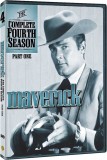| Reviews & Columns |
|
Reviews DVD TV on DVD Blu-ray 4K UHD International DVDs In Theaters Reviews by Studio Video Games Features Collector Series DVDs Easter Egg Database Interviews DVD Talk Radio Feature Articles Columns Anime Talk DVD Savant Horror DVDs The M.O.D. Squad Art House HD Talk Silent DVD
|
DVD Talk Forum |
|
|
| Resources |
|
DVD Price Search Customer Service #'s RCE Info Links |
|
Columns
|
|
|
Maverick: The Complete Fourth Season (Warner Archive Collection )
"Aint it somethin' to watch one of these Maverick boys when he's schemin'? You just hear the wheels a'grindin'!"
Moore is less. Warner Bros.' Archive Collection line of hard-to-find cult and library titles has released Maverick: The Complete Fourth Season, a 6-disc, 32-episode collection of the once-mighty ABC Western comedy drama's 1960-1961 season. With James Garner long gone (save for one leftover episode...while smooth, funny Jack Kelly holds down the fort), and the temporary addition of Roger Moore (and even more temporary Robert Colbert), this fourth go-around for Maverick was doomed to fail--not as much for all those casting shenanigans...but because the increasingly familiar, lackluster (screen)writing was already on the wall. No extras for these excellent fullscreen black and white transfers.
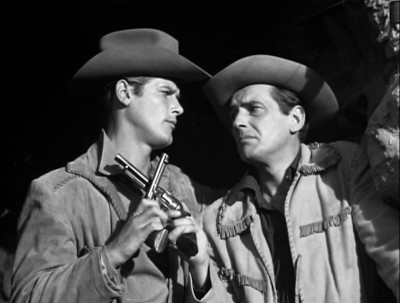
For those who haven't seen Maverick, its set-up is as elusive as the Maverick brothers themselves. In post-Civil War America, handsome, rootless gambler Bart Maverick (Jack Kelly) travels from saloon to river boat, from California to Texas to New Orleans to Mexico, looking for the next poker game and his next buck. Flush one minute and skint the next, adventurer Bart keeps a $1000 dollar bill safety-pinned to the inside of his coat for insurance (just like his Pappy always told him to do), while wearing a sardonic, often bemused countenance that masks a heart of gold. Bart, an expert card sharp and bluffer ("fair" with a pistol, too), never cons anyone who isn't trying to con him first, and any ill-gotten gains he receives from his various ploys, he usually distributes to the swindlers' victims...after taking his cut to cover expenses, of course. Female attention is certainly welcomed by Bart, but he doesn't trust it, and he's usually proven right when the various gorgeous ladies that fall for the handsome Bart turn out to be cheats, liars, or virtuous women forced to fib to get Maverick's help in their schemes. Oh, and Bart has a cousin and one other brother (besides absent Bret, played by James Garner), equally cynical charmers that he runs into from time to time: fair-haired, equally handsome, equally rootless cousin Beau Maverick (Roger Moore), who picked up a light accent after spending a few years in England, and brother Brent Maverick (Robert Colbert)...who looks suspiciously like old brother Bret. Both Beau and Brent live and love the same way Bart does: with one eye on the cards and another on the exit door when a lovely temptress figures to pull a fast one on them.
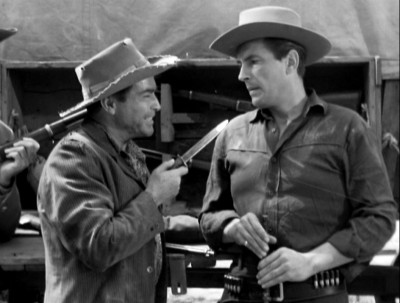
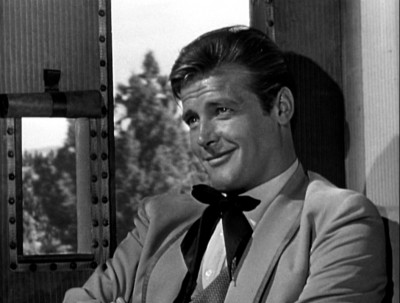
Certainly for Maverick's fourth go-around, the most interesting aspect of this continuously contentious, troubled production was the departure of star James Garner and the arrival of his two substitutes, Roger Moore and Robert Colbert, rather than the decreasing quality of the show itself...which had already begun faltering in the third season, anyway. As I wrote in my previous review of that season, TV audiences back in 1957 responded immediately to Maverick's relatively complex scripting, its delightfully off-center characters, and its almost indescribable atmosphere of "something new" in a particular genre--if not "new" in storylines, for many were borrowed and adapted, then "new" in approach--that low, buzzing, electric excitement a viewer feels when they realize they're watching something..."other" than what they've watched before. That buzz, though, must necessarily wear off if a show fails to continue to evolve and to surprise, and with this fourth season of Maverick, even more so than the third...the surprises just aren't all that surprising anymore. In other words, you can have Bart romance yet another pretty lady who turns out to be a crook, or have newcomer Beau execute the Maverick-patented quadruple-cross flim-flam scam only so many times, before the audience gets out ahead of the show, enjoying what the producers are doing less and less as they begin anticipating more and more where an average episode is going to predictably wind up.
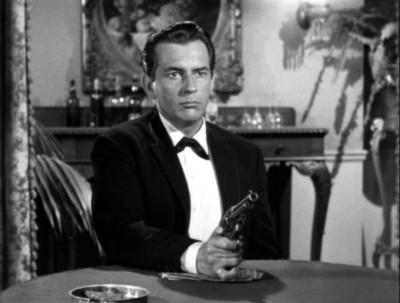
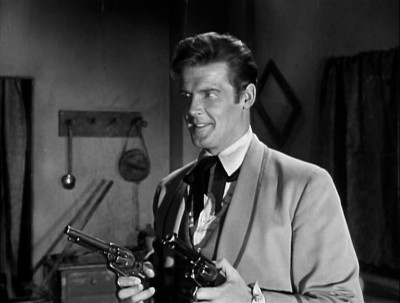
I've already written extensively about Maverick's complicated origins and Garner's subsequent decision to leave the show, so I won't rehash that here (you can read those reviews here). Suffice it to say, when Garner finally called it quits, Warner Bros. still had a relatively successful Western on its hand (it had been 19th in the Nielsen's the previous year), minus one critical lead player. With Maverick's extended production schedule, where separate crews worked simultaneously with the two leads to ensure alternating episodes every other week, another actor would have to quickly step in for Garner. So, after future James Bond superstar Sean Connery accepted a trip to America just to turn down the part, future Saint and James Bond superstar Roger Moore was signed--an event that sounds momentous today, considering Moore's iconic stature...but which at the time was barely newsworthy for a working English actor that most American TV viewers probably couldn't name. Moore was a former model in Great Britain who scored an unsuccessful contract with MGM in the mid-50s (Interrupted Melody, The King's Thief, Diane), before he freelanced, working on both the small screen (U.K.-filmed kiddie series, Ivanhoe) and large (the 1959 Warner Bros. fizzle, The Miracle), before he signed up with Warners for a co-starring role on the primetime action-adventure show, The Alaskans. Part of a trio of new series offered by Warners to ABC for the 1959-1960 season (the other two being the almost identical Bourbon Street Beat and Hawaiian Eye), The Alaskans was an effort to literally clone the success of Warners' huge hit from the previous season, the hip detective series, 77 Sunset Strip--a labored effort at mechanical imitation that included recycled scripts from Maverick and Bronco, just to name a few, with only the names and dates and locales changed to fit The Alaskans' 1880s Gold Rush milieu. Although The Alaskans lasted just one season, it was enough for Moore to impress Warners, who offered him Garner's empty spot on Maverick for the 1960-1961 season--an offer he took with an important loophole: he could leave Maverick after one year, if he so wished.
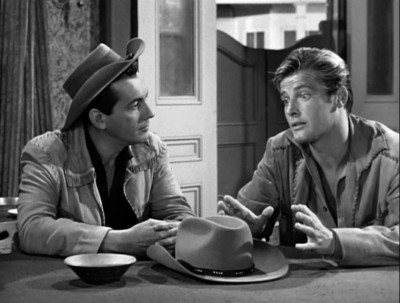
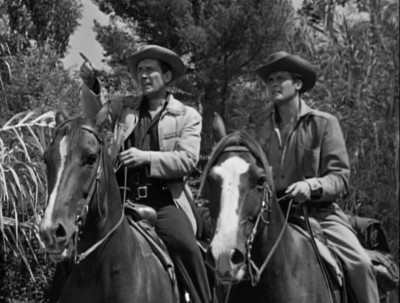
In short, the general consensus on Moore's abbreviated tenure on Maverick seems to be that it failed with the public, by and large, because viewers missed James Garner. No doubt Garner's absence was a factor in the show's declining popularity; however, it's important to remember that ratings for Maverick's third season--which prominently featured Garner--had already slipped significantly from season two. If, as Moore later stated, increasingly poor fourth season scripting was instrumental in Maverick's continued ratings' fall--and it certainly was--that situation began long before he signed on (as I wrote in my third season review). Despite some critics (and a certain star...) insisting that James Garner was the whole shebang in Maverick, audiences did cotton to the addition of Jack Kelly in the first few weeks of the first season, with viewers taking particular delight whenever the Maverick boys teamed up for a joint episode. As I wrote in a previous review, when Kelly came in at episode eight of season one, Maverick added another layer to its genre-bending scheme, becoming a game outside of the actual experience of watching the show, giving the viewer a chance to step back and ask which brother/actor was better? Which one was sexier? Which one smoother? Funnier? Who was the better scammer? The audience didn't know which Maverick brother would pop up from episode to episode (maybe it would be both!), giving the proceedings just that much more unpredictability, that much more open and deliberately artificial dash. Unfortunately, all of that (through no fault of his own) was lost when Moore signed on, in large part because so much public ruckus had been kicked up about Garner's lawsuit against Warners and his subsequent departure from the show. Maverick's audience (what remained of it, that is) couldn't accept this rather laid-back, bemused Englishman as a Maverick "cousin" because it wasn't allowed any ignorance about the casting. They already knew it was an arbitrary addition to the show. And with only three co-starring episodes alongside Jack Kelly (a bad move on the producers' part), no real sense of "family" is created between the two characters...nor, more importantly, any palpable chemistry between Kelly and Moore--something Garner and Kelly had instantly (as for Robert Colbert...his brief two-episode stint can better be discussed below). As to Moore in his solo episodes, well....
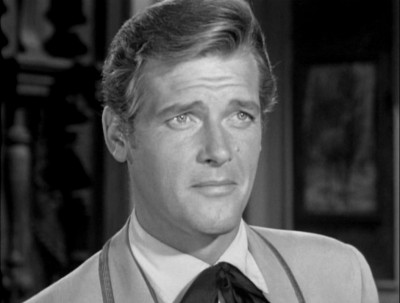
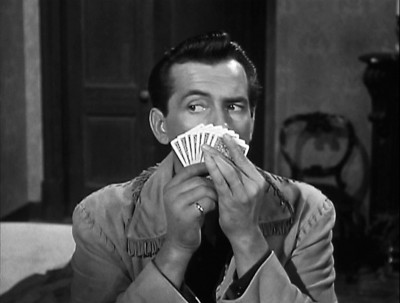
The season opener, The Bundle from Britain, written by Ron Bishop, introduces Moore to Maverick fans...and it's a mixed bag. An amusing, if thoroughly familiar by-now, Maverick outing, some good lines (Bart is asked if he's a patron of the arts, to which he replies, "All 52,") vie with Moore's genial disposition, resulting in a relaxed, if inauspicious, debut. It's difficult to find fault with Moore personally (he can be so charming and amusing), but it's also difficult to not notice his self-observant standoffishness; his bemused contempt for the part. That kind of attitude is deadly for television, where the viewer, particularly during this time frame, wanted to welcome a friend into their home, week after week. Garner and Kelly were agreeably cynical, too, but they countered it with a playful, warm tone. Moore, strangely, seems alternately light and sneering, while continually giving off an air that he's "above it all" here (he eventually got that way with The Saint and Bond, too, for that matter...). It's pretty clear with this first episode that he's not suited for either the role, or weekly TV. Hadley's Hunters is mostly noted as a "stunt casting" episode featuring a roster of Warner Bros' TV stars making cameo appearances, including John Russell and Peter Brown from Lawman, Will Hutchins from Sugarfoot, Ty Hardin from Bronco, Clint Walker from Cheyenne, and Edd "Kookie" Byrnes from 77 Sunset Strip combing a horse's mane (a funny bit: the empty sheriff's office of the recently cancelled Colt .45, complete with cobwebs, is featured). Even future Maverick brother Robert Colbert shows up...wearing a black hat suspiciously like James Garner.
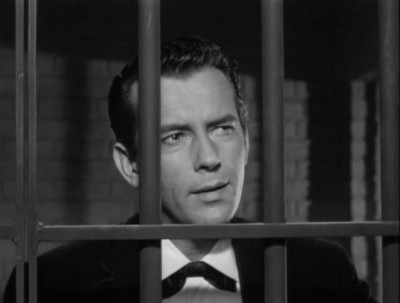
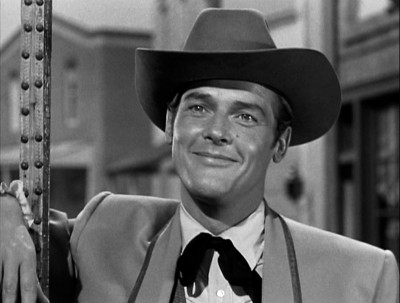
Screenwriter Arthur Paynter comes up with an amusing one in The Town That Wasn't There, a complicated scam episode where Beau advises a town to literally pick up sticks and move--several times--to outwit a greedy railroad speculator. Good support from sexy Merry Anders, but Moore still can't get the easy-going rhythm of the show down: he looks, in a word, uncomfortable. Arthur Paynter scores again with the frequently hilarious Arizona Black Maria, but this time Jack Kelly stars, achieving just the right amount of smooth, assured, smart-assed resolve to carry over this back-and-forth triple-cross outing (when an Indian comments, "Paleface [Kelly] has white squaw in wigwam," another deadpans, "Some medicine,"). Last Wire from Stop Gap, from Herman Epstein, is a fitfully humorous outing for Kelly and Moore that hides its predictable outcome with some speedy direction, and a fine supporting cast of familiar faces, including Tol Avery, Land Bradford, and Robert Cornthwaite. The writing team of actor Leo Gordon and Paul Leslie Peil show up (they'll have several episodes this season) for the middling, familiar "Black Hand" mafia outing, Mano Nera, a relatively straight entry for Kelly that almost plays like a potential pilot for the Anthony Caruso detective character. The limitations of the Gordon/Peil screenwriting team is again shown in A Bullet for the Teacher, where the good premise of luscious Kathleen Crowley's chorus girl pretending to be a teacher ("Now we'll have some history and stuff...") isn't fully developed, with potential gags and jokes hinted at, but never brought home (Moore is amusing in that country bumpkin outfit).
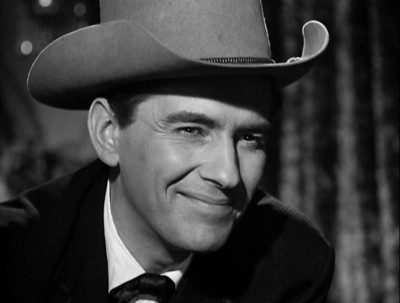
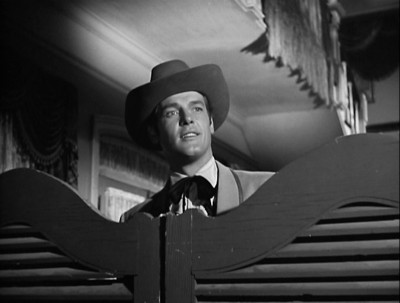
Mae Malotte comes up with a funny, slapsticky bit of nonsense in The Witch of Hound Dog, when the recognizable story of a willful, uneducated beauty (the terrific Anita Sands), believed to be a witch by the superstitious townsfolk, is combined with an equally familiar tale of murderous hillbillies...with handsome Bart stuck right in the middle. Series regular Leo Townsend takes a standard "cavalry fort under siege" story in Thunder from the North and tweaks it nicely into a good showcase for Kelly's forte--light romantic comedy--when he becomes entangled with pretty Indian maiden Andra Martin. A cool set of warrior trials awaits Kelly, while Townsend pulls off a clever denouement involving thunder, cannon fire, a totem, and Indian prophecy. Kelly excelled at this kind of story. No doubt the most curious episode of the fourth season--at least to startled viewers--was The Maverick Line, from Wells Root and Ron Bishop, starring...James Garner and Jack Kelly. Leftover from the previous season, and intended to start off this fourth go-around, it was held back to allow Roger Moore to debut, leaving viewers puzzled when Bret inexplicably pops back into the Maverick fold. As usual with a Root and Bishop, the double crosses keep coming at a pleasing clip, and as usual, Garner and Kelly seem like they're having a lot of fun working together. A bittersweet end to Garner's participation in this Maverick incarnation. And certainly the most disappointing outing this season, from a historical standpoint, has to be Bolt From the Blue, scripted and directed by Robert Altman. Altman did a lot of episodic television prior to his celebrated big screen career--some of it quite remarkable (his Silent Thunder episode from Bonanaza, with Stella Stevens, is a classic). This tired criss-cross, though, doesn't seem to indicate any hidden talent of particular note is behind it all. Always nice to see the beautiful Fay Spain hamming it up, but Will Hutchinson's appearance as the unnamed "lawyer," we assume, from Sugarfoot, is annoyingly coy.
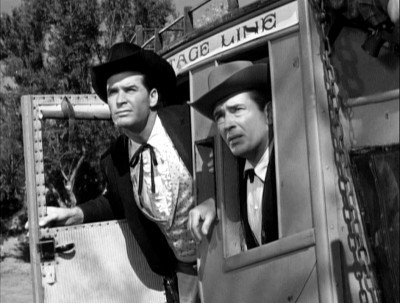
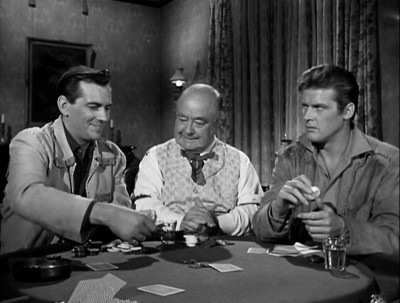
Much better is Leo Townsend's and Laszlo Gorog's Kiz, a terrific vehicle for series regular Kathleen Crowley, playing a wild, passionate, unbalanced woman being Gaslighted by someone close to her. It would have been even better if Kelly had starred in this one; the more intense scenes between Moore and the talented Crowley are a bit unbalanced. Kelly's facility with such material is on display in Herman Epstein's fun Dodge City or Bust, where Kelly matches wits with pretty little schemer Diana Millay (the bracketing sequences with Kelly, and then Moore playing insanely complicated poker games is pretty funny if you're a card player). Moore fares much better in Robert V. Wright's The Bold Fenian Men, where Moore's natural ability at light-hearted farce comes in handy in this clever story about the "Irish Revolutionary Brotherhood"'s plan to invade Canada to force a war between England and the U.S.. Lots of funny Irish-themed jabs, and Moore cheekily facing a firing squad he (mistakenly) believes can't hurt him, is one of his best moments in the series. Robert V. Wright scores again with the breezy Destination Devil's Flat, where Kelly, broke and starving, sneaks into a free church potluck and winds up entangled with reformed card dealer "Frisco" Marybelle McCall (hot as hell Merry Anders). Original series producer and creator Roy Huggins once asserted that Jack Kelly couldn't sell a funny line, but you don't get a much better cynically amusing reading than Kelly's, "Watch those generalizations, Deacon," to Frank Ferguson's all-inclusive, "Those that sin will repent." A Robert Louis Stevenson story is adapted by Larry Welch for A State of Siege, a familiar but well-executed "siege" story that raises some interesting, if underdeveloped, questions about revolutionary politics and personal bravery--this is precisely the time that I wish the usually free-wheeling, laid-back Maverick could have occasionally gone a little deeper, like contemporaries Bonanza and Gunsmoke, with a potentially rich story like this one (one of Bart's best lines in the series is here; when asked by a friend if Bart is going to rat them out to the authorities, Bart replies with a dead-serious face, "I don't turn people over to the law--I don't feel that close to it,").
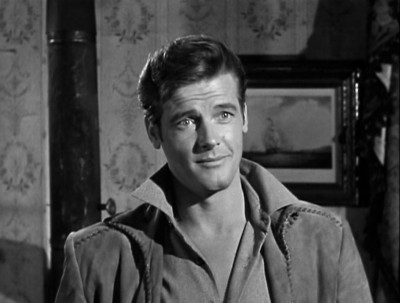
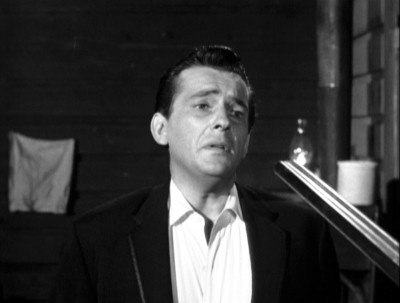
Screenwriter Catherine Kuttner delivers a deliciously funny outing--one of the season's best--with Family Pride, where Moore gets repeatedly stung by con artists extraordinaire Karl Swenson, Robert Cornthwaite, and Anita Sands. This one plays very well off the notion that the Maverick boys simply can not be beat at their own game...until Beau finds out just who's beating him over and over again. A real treat, with Anita Sands again providing skilled, lovely consternation to a Maverick brother (watching this adept little meller, I was again taken aback over how common it was, during television's so-called "vast wasteland" period, to have writing of this quality and these kinds of talented performers, appear on so many shows with almost boring regularity. You should see TV now, Newton....). This fourth season keeps rolling with the entertaining The Cactus Switch, from Fenton Earnshaw, that sees Kelly battling scurvy dog Edgard Buchanan in a complicated swindle. The opening, with Kelly besting two sharpies cheating him with marked cards and dark glasses, has an almost Bondian pre-title sequence feel to it, while some amusingly anachronistic jokes keeps it feeling modern (Kelly, reassuring a frightened Fay Spain that the Indian confronting them on the street won't harm them, offers the Indian a friendly, "Ugh!", to which the Indian sensibly responds, "Hiya, bub,"). One of this season's better offerings. The same most certainly can not be said for Dutchman's Gold, from William Bruckner, which has to be one of the most embarrassing Mavericks I've seen, from the cornball sing-songy High Noon narrative theme song (and no, I don't think it's trying to be ironic), to the final laughable superimposition of a laughing, dead Jacques Aubuchon, which looks like something from a silent movie. Just plain awful--I could see this kind of episode making Moore want to quit the series.
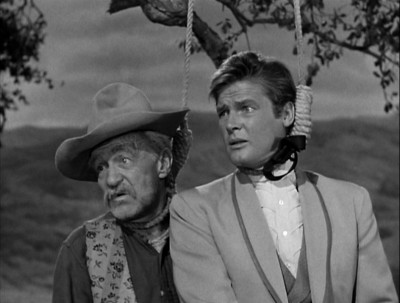
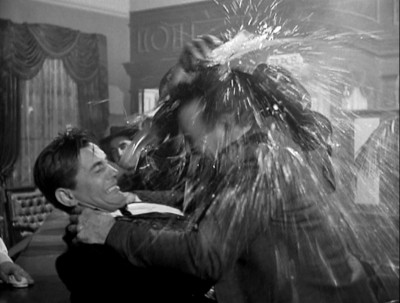
Kelly returns in the solid whodunit, The Ice Man, scripted by Peter B. Germano, which revolves around a cool (sorry) premise: an ice-encased body found by Bart holds the key to a murder, with the suspect unable to retrieve the key piece of evidence--a bullet inside him--without dying on the operating table. Excellent support from Andrew Duggan (the perfect kind of role for him) and a young, talented Shirley Knight. Scripters Gordon and Peil return, and none the better, with Diamond Flush, an obvious little back-and-forth that finds an increasingly glum, distracted Moore matching wits with sharpies Anna Lee, Dan Tobin, Ted de Corsia, and Sig Ruman (a light touch was needed here...while Moore looks pissed off). Howard Browne comes up with a hard, creepy thriller, with morbid, noirish overtones, Last Stop Oblivion, where Kelly has to battle murderous Buddy Ebsen and even worse wife and mother Virginia Christine, who run a little way station...where they kill riding-through travelers (it's bad enough to see kindly Jed Clampett steeling his eyes before blowing someone away, but watching Folgers' Coffee sweetie pie Mrs. Olson not even flinch when her dying son clutches her, screaming, "Ma! Ma!" is one of the more perverse little moments in 60s pop culture). Moore finally gets a better vehicle in the moody Flood's Folly, written by George F. Slavin, which finds Beau holed up in an opulent, deserted, isolated hotel out in the middle of the frozen nowhere, aligning himself with "crazy" Marlene Willis, while evil forces hover in the background. Clever little twist with the jigsaw puzzle, some unsuspected turns in the plot, and good performances all around, particularly the talented Jeanne Cooper as Marlene's mysterious aunt.
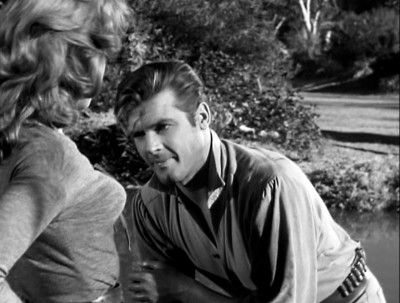
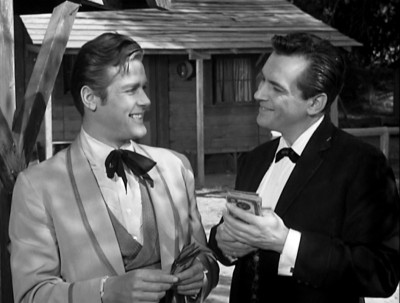
Maverick at Law, from David Lang, may not surprise you with its predictable plot about a meek bank clerk exacting revenge on his blackmailing employer, but you'll enjoy the energetic turns by the fun cast...including sexy as hell Dolores Donlon (a former Playboy Playmate) who seems to be having a good time reminding Kelly about "whistling" when they kiss. Fun. Roger Moore's last episode of Maverick couldn't be a more spookily accurate depiction of his situation on the show: Beau shows up at a bad guys' meeting place, unaware of what's going on, and remaining in the dark--and on the sidelines--throughout the entire episode (Moore's completely pissed-off face speaks volumes about his situation on the show). A bizarre bow-out for Moore, scripted by Montgomery Pittman (once a regular writer for Maverick, in his only appearance this season), with witty turns by John Carradine and Mike Road, an appropriately sinister one by Lee Van Cleef...and a pretty hot one from built Sherry Jackson as a married, and ready-to-cheat, little tramp. Gordon and Peil come up with another hackneyed plot in The Deadly Image, a standard "evil twin" take-off that finds Bart fighting mistaken identity with a look-alike villain. Always good to see Gerald Mohr, while Dawn Wells does well in a serious turn. Irene Winston delivers the goods with Triple Indemnity, one of the season's best, when Peter Breck makes his first appearance as Doc Holliday, scoring instant give-and-take rapport with Kelly in this twisty, funny outing (do you think someone was floating the idea of making him an every other week regular, to replace Moore...because he's dynamite here).
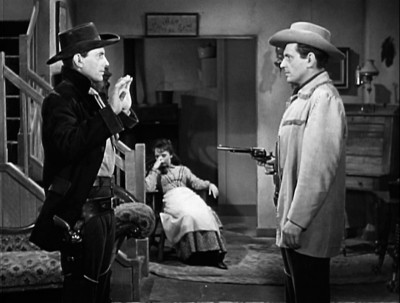
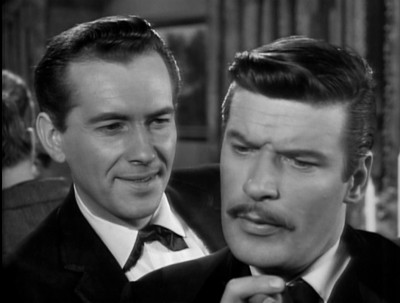
...and then we have Robert Colbert, a last-minute addition to the Maverick family as brother Brent, in The Forbidden City. Fans of Maverick know the story of Colbert pleading with Warners to put him in a dress rather than in an exact replica of James Garner's costume, right down to the black hat pushed back two thirds of the way. However, what he's wearing has little to do with how he comes over here...and that's not too impressively, I must say. Despite a script by Wells Root, and direction by Richard C. Sarafian (Vanishing Point), The Forbidden City comes off as a cold, stagnant affair, with Colbert alternately cocky (in an unpleasant, ungainly way) and turgid. "Inauspicious" doesn't begin to describe his debut (and boy does Kelly look non-plussed by his arrival). With the exception of a first-rate bar fight, there's not much to recommend in Howard Browne's Substitute Gun, a pedestrian outing for Kelly involving competing saloons. Tedious and overly-familiar. Colbert returns for his second--and last--outing as Brent Maverick in David Lang's Benefit of the Doubt, a remarkably staid, boring outing for a Maverick episode, with nothing to distinguish it as coming from this once innovative Western. Goodbye, Colbert. Finally, the season ends on a high note with the series' only two-parter, The Devil's Necklace, from William Buckner. A rather standard "cavalry fort under siege" outing, this one takes its time in telling its involved story, with lots of tasty subplots, under the sure hand of director Paul Landres. A remarkably violent episode for a Maverick, this two-parter has dozens of people slaughtered in it, culminating in a rather dynamic close-up of Kelly strangling Indian Michael Forest to death with a bear-tooth necklace. Wild. Excellent supporting cast, including John Archer, Steve Brodie (playing a real rat who knifes his wife in the back to get a job promotion), John Hoyt, John Dehner (playing an even worse rat than Brodie), and Sharon Hugueny in an inexpert but still rather touching turn as an Indian maiden, falling for gentle Kelly (Garner couldn't touch him in romantic scenes like those). The Devil's Necklace may not have been terribly original, or particularly connected to the Maverick conventions...but it at least delivers, with some verve, the rough-minded Western goods.
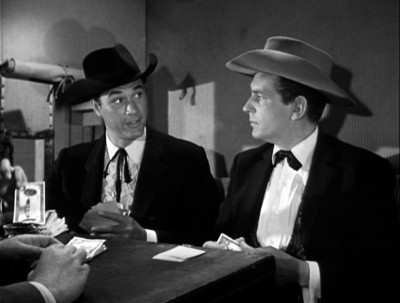
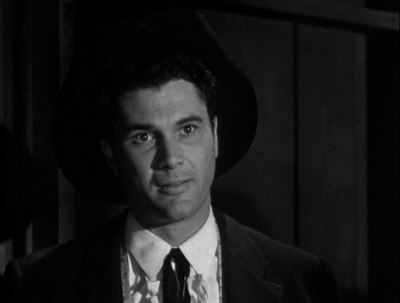
Fans of the series, however, were less and less inclined to tune in and see if a particular Maverick episode was going to deliver or not. With new (and weak) lead-in Walt Disney Presents at 6:30pm on Sundays (rather than the previous season's Colt .45 and Broken Arrow), Maverick at 7:30pm had no direct competition over on NBC, which threw the last half hour of Shirley Temple's Storybook and National Velvet at Bart and Beau. However, over on CBS, Maverick was decimated by the growing family-friendly sitcom, Dennis the Menace, which came in at a remarkable 11th in the Nielsen's, followed by the first half-hour of The Ed Sullivan Show, at 15th for the year. Forced to face the facts of its free-fall ratings, Maverick would move back to the deadly 6:30pm Sunday night slot the next year...and get put down for good by a preternaturally smart collie and a talking moose.
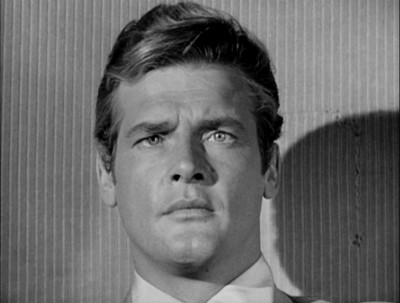
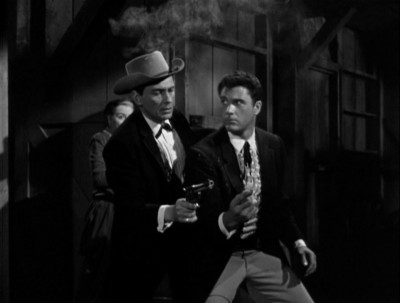
The DVDs:
The Video:
The fullscreen, 1.37:1 black and white transfers for Maverick: The Complete Fourth Season looked quite sharp, with solid blacks that hold, good contrast, decent fine detail (Triple Indemnity, though, looked second generation, at least), and few if any imperfections.
The Audio:
The Dolby Digital English mono audio track is fine, with light hiss, some fluctuation in a couple of episodes, but nothing distracting overall. No subtitles or closed captions available.
The Extras:
No extras for Maverick: The Complete Fourth Season.
Final Thoughts:
The thrill is gone. Whatever made Maverick innovative in its first two seasons is quickly becoming a memory by this point in the series, replaced by hit-and-miss writing, and two failed attempts--the arch Roger Moore and the oily Robert Colbert--to replace James Garner. Fans of the series will still watch, though, and for a handful of stand-out episodes and Jack Kelly's continued good work here, I'm recommending Maverick: The Complete Fourth Season
Paul Mavis is an internationally published movie and television historian, a member of the Online Film Critics Society, and the author of The Espionage Filmography.


|
| Popular Reviews |
| Sponsored Links |
|
|
| Sponsored Links |
|
|
| Release List | Reviews | Shop | Newsletter | Forum | DVD Giveaways | Blu-Ray | Advertise |
|
Copyright 2024 DVDTalk.com All Rights Reserved. Legal Info, Privacy Policy, Terms of Use,
Manage Preferences,
Your Privacy Choices | |||||||









